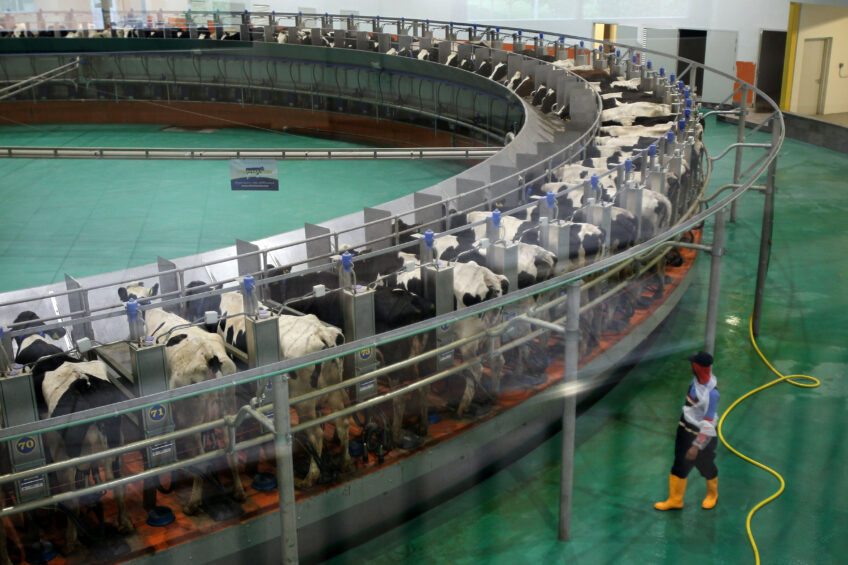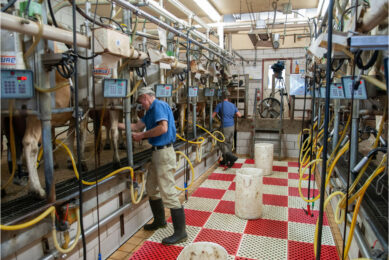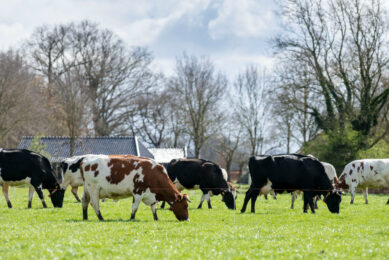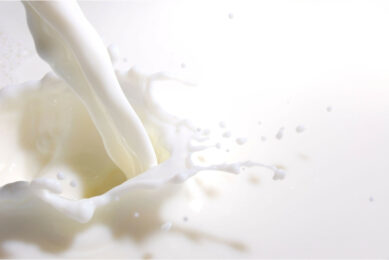Baladna Farm to meet total dairy demand Qatar

Around 55km from Qatar’s capital city Doha lies the Baladna Farm. This farm has set up its own dairy unit to meet the demands for dairy produce in the Arabian country.
Baladna is a subsidiary of Power International Holding, which is a well-diversified Qatari company. Built over 700,000 square metres Baladna Farm includes 40,000 Awassi sheep, kept as they are able to withstand high temperature and produce high-quality milk.
The farm also houses 5,000 goats and operates an animal feed mill yielding 100 tonnes per day. Under guidance from farm chief executive officer John Dore, who originally hails from County Kildare in Ireland, Baladna Farm decided to erect and operate its own cow dairy enterprise in the wake of political blockages that were imposed on Qatar by its neighbours.
Also read: Qatar’s dairy demand spurred by crisis
Back in June, Saudi Arabia, the United Arab Emirates, Egypt, and Bahrain severed all diplomatic ties with Qatar as they believed it supported terrorism. On top of this, these countries imposed a boycott on all trade and imports from them to Qatar.
These blockages meant the normal imports of dairy produce, mainly supplied by Saudi Arabia, could no longer be received. So, Baladna Farm decided to set up its own unit to meet the home demand.

Flying cows into Qatar to build up herd
As building work got underway, cows were being sourced around the world and flown into Qatar by Qatar Airways. Currently, there are 1,800 Holstein cows in the herd but the goal is to run a massive herd with 14,000 cows in the future to supply the majority of the country’s dairy demand. John Dore said more cows are on the way from the United States to rapidly grow the herd to reach the levels required. “We currently have 1,800 cows in the herd yielding 30 litres per cow per day. At Baladna we process, pack and distribute all our own milk which means the farm basically gets paid for volume. Currently we are building a new 500 tonnes per day dairy and juice factory to utilise our milk,” according to Dore. The milk we are producing is 3.6% butterfat. Milk retails in the shops here in Qatar for 7.5 Qatari Riyal per litre (£1.54, €1.74, US$2.06, CAN$2.61).
Filling the void after blockades
In Qatar there are 3 dairy farms that produce and process their own milk under their own respective brands. There are also a number of smaller privately owned dairy herds that produce milk for the owner’s consumption. John says Baladna Farm has plans to develop its dairy herd at a fast pace in order to fill the void left after Qatar’s neighbours imposed the blockades. “We aim to have 14,000 cows plus followers. In addition, we aim to fatten bulls at 10 months old for the beef chain as well. Holstein cows are currently being sourced in the United States for us. It is our intention to be able to supply the majority of the demand for dairy produce in Qatar as early as next year,” he added.
Dealing with the desert heat
Baladna Farm has erected air-conditioned barns to accommodate the cows. Temperatures can hit 48°C in Qatar on the farm as it is situated mostly in a desert. Keeping the cows cool in air-conditioned barns is a challenge, according to John.
Dore: “The challenge is humidity. It’s the trickiest at dawn and dusk and drops in the middle of the day so that’s when you need to get things done.”
The farm is also using a 100 unit rotary parlour that can milk 750 cows per hour per 200 units. Building ideas and themes have also come from the United States with the cows in Qatar lying in cubicles on rubber crumb mattresses.
100% market share by April
Currently John and the team are supplying around 40% of the market in Qatar but hope to increase that to 100% by April 2018 when the herd is further expanded.
Join 13,000+ subscribers
Subscribe to our newsletter to stay updated about all the need-to-know content in the dairy sector, two times a week.












